高中英语外研版选修八Module6 The Tang Poems-Reading Practice课件(23张PPT)
文档属性
| 名称 | 高中英语外研版选修八Module6 The Tang Poems-Reading Practice课件(23张PPT) | 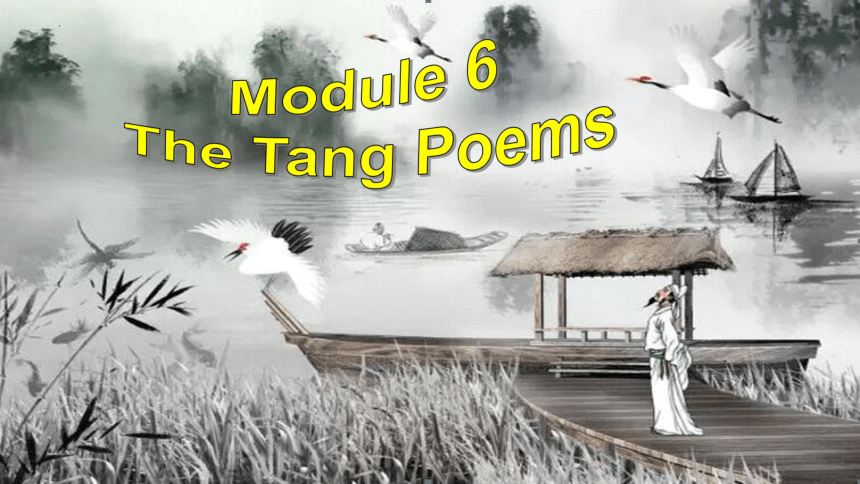 | |
| 格式 | zip | ||
| 文件大小 | 1.5MB | ||
| 资源类型 | 教案 | ||
| 版本资源 | 外研版 | ||
| 科目 | 英语 | ||
| 更新时间 | 2022-03-09 08:54:02 | ||
图片预览


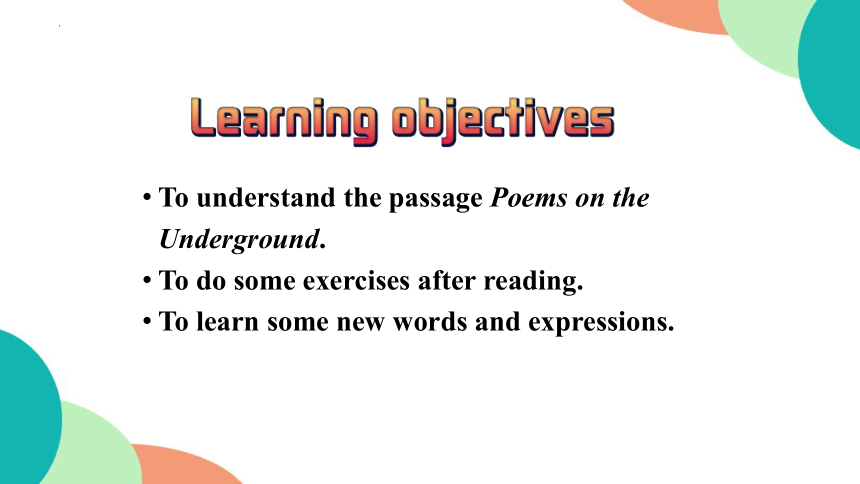
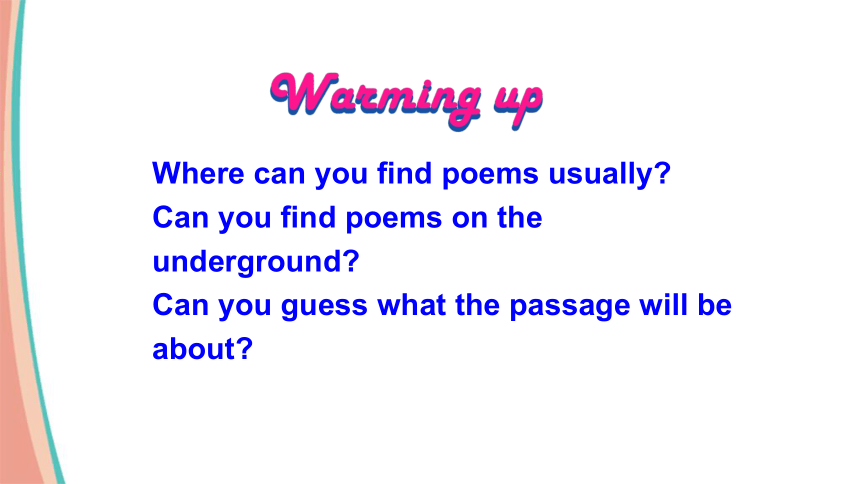
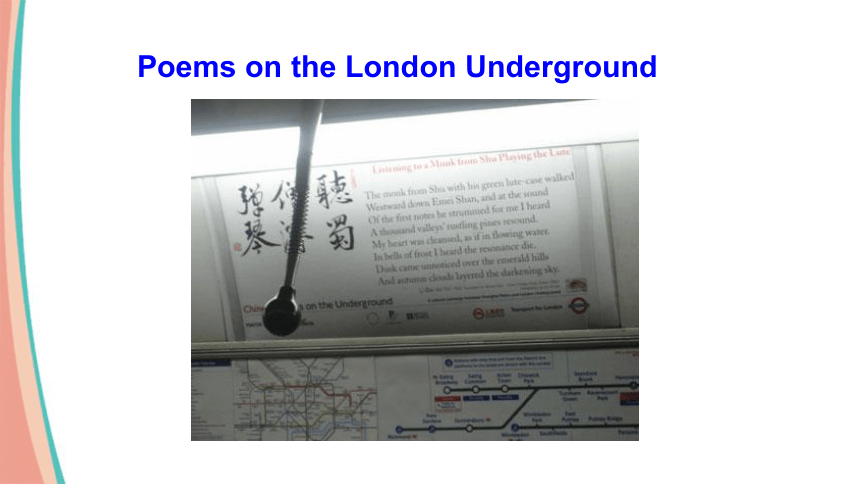
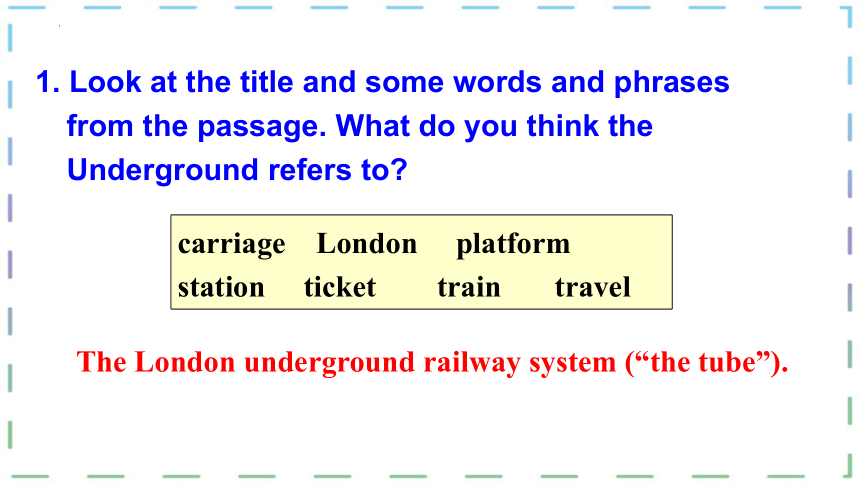
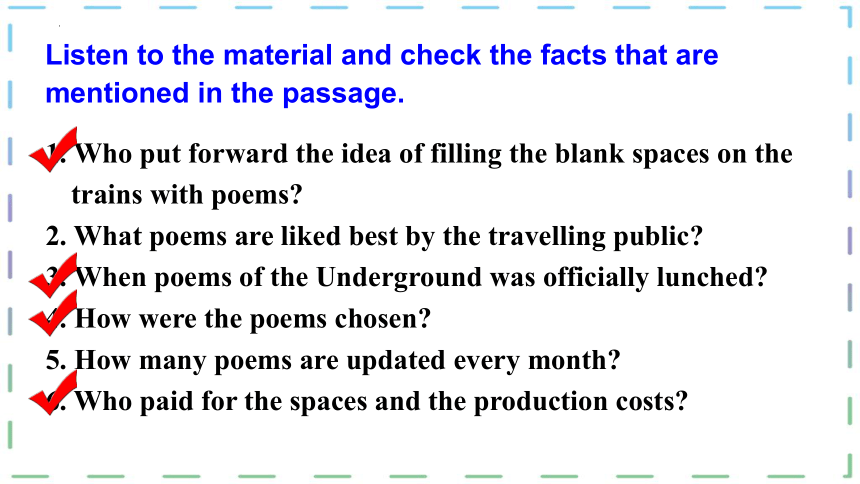
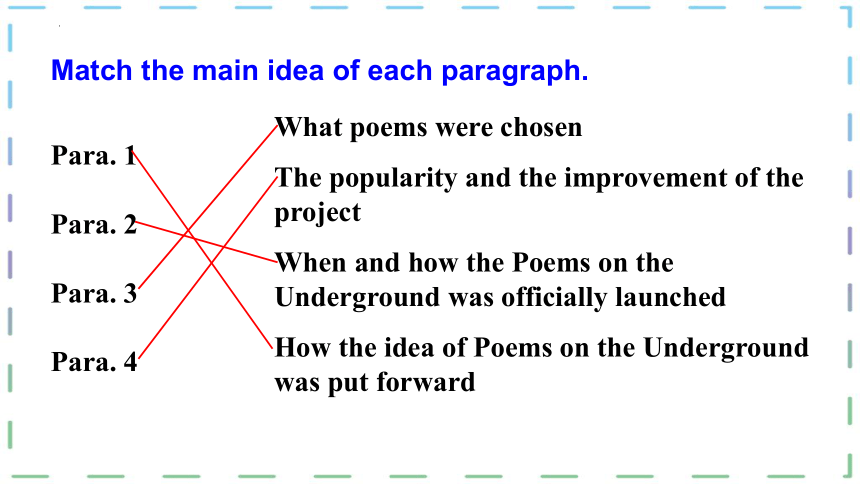
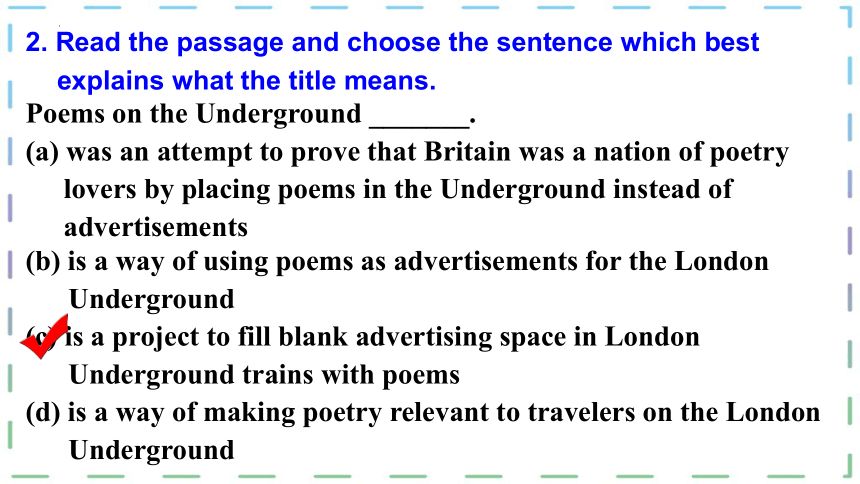
文档简介
(共23张PPT)
Module 6
The Tang Poems
To understand the passage Poems on the Underground.
To do some exercises after reading.
To learn some new words and expressions.
Where can you find poems usually
Can you find poems on the underground
Can you guess what the passage will be about
Poems on the London Underground
1. Look at the title and some words and phrases from the passage. What do you think the Underground refers to
carriage London platform station ticket train travel
The London underground railway system (“the tube”).
Listen to the material and check the facts that are mentioned in the passage.
1. Who put forward the idea of filling the blank spaces on the trains with poems
2. What poems are liked best by the travelling public
3. When poems of the Underground was officially lunched
4. How were the poems chosen
5. How many poems are updated every month
6. Who paid for the spaces and the production costs
Match the main idea of each paragraph.
Para. 1
Para. 2
Para. 3
Para. 4
What poems were chosen
The popularity and the improvement of the project
When and how the Poems on the Underground was officially launched
How the idea of Poems on the Underground was put forward
(b) is a way of using poems as advertisements for the London Underground
(c) is a project to fill blank advertising space in London Underground trains with poems
(d) is a way of making poetry relevant to travelers on the London Underground
Poems on the Underground _______.
(a) was an attempt to prove that Britain was a nation of poetry lovers by placing poems in the Underground instead of advertisements
2. Read the passage and choose the sentence which best explains what the title means.
(b) The writer finds that trying to learn Poems on the Underground adds to their meaning and their enjoyment.
(c) The writer believes that poems change the atmosphere in the carriages on the London Underground.
(d) The writer believes that Poems on the Underground encourages people to write their own poetry.
(a) The writer thinks Poems on the Underground has been very successful, and is a good way to read poetry cheaply all over London.
3. Decide which of these statements expresses the writer’s opinion.
4. Choose the correct answers.
1) Poems on the Underground was set up by _____.
(a) poets and writers (b) commuters and poetry lovers
(c) the London Underground (d) people in advertising
2) Poems first appeared in January 1986 _______.
(a) at Aldwych Underground station
(b) on the platform at Aldwych station
(c) in every zone of the underground network
(d) in a train which left from Aldwych station
3) The poems were _______.
(a) removed from books and placed in empty advertising spaces
(b) taken from all over the English-speaking world and chosen to please everyone
(c) those about London by Shelley, Burns, Keats and by the commuters themselves
(d) meant to be read aloud and learnt by heart
4) The advertising space and the production costs are now paid for ___.
(a) by the British Council (b) by the poetry lovers
(c) half by sponsors and half by London Underground
(d) by London Underground
5) The best place to see the poems is ___.
(a) in any train on the network
(b) in libraries around the world
(c) in trains on the Central Line and between Hammersmith and Piccadilly
(d) in some carriages anywhere on the network
5. Say what the writer means by these sentences.
1) Many (…) saw the usual signs – TICKETS AND TRAINS, THIS WAY DOWN, CAUTION! DON’T CLIMB ONTO THE LINES, STAND CLEAR, DOORS CLOSING –
assume a special literary significance.
Because there was a literary event, even the everyday signs seemed like poetry.
2) The carriages were merry with a chorus of voices reading verse by Shelley, Burns and of course, by themselves.
The poets and other guests at the official opening of the scheme read the poems displayed on the train by various writers, including themselves.
3) Commuters enjoyed the idea of reading Keat’s Much have I travell’d in the realms of gold on a crowded Central Line train.
It was fun to read Keats’ poem about travelling in the classical world, whilst being in a crowded tube train in London.
4) In January 1989, (…) London Underground promised to donate all the spaces free, to increase the number available (…), and to pay for the production costs as well.
The scheme was so successful that London Transport offered to take over all the costs of continuing it itself.
5) … the best way to view the poems is to see them yourself, on whichever train you choose, in every zone of the network – for the price of an underground ticket.
Reading poems on the underground is a very cheap way to enjoy poetry in London.
6. Write short answers to the questions.
1) What does the passage tell you about life for commuters in London
It has been improved by the scheme.
2) What does the passage suggest about London Underground’s attitude to Poems on the Underground
It is positive.
3) Do you think the idea might work on buses or trains in your town or region If so, what poems would you choose
Can you think of anything other than poems which might have a similar effect
I. 根据所给英文释义,从课文中找出相应的单词。
attraction or interest (Para.1)
people who know each other through work or business but who may not be friends (Para.1)
more of something than is needed (Para.1)
to agree officially (Para. 2)
a person or business that pays money to an event, programme etc. (Para. 2)
appeal
acquaintances
surplus
approve
sponsor
6. the action of departing (Para. 2)
7. decided by personal opinion or chance rather than reasoning (Para. 3)
8. to consider or take account for (Para. 3)
9. to prove that something is true (Para. 4)
10. to exchange letters regularly (Para. 4)
departure
arbitrary
cater
confirm
correspond
II. 根据提示翻译下面句子。
1. 我们得满足他们的需求。 (cater for)
2. 他的父亲不赞同他的选择。 (approve of sth.)
We have to cater for their demands.
His father does not approve of his choice.
3. 我在和一个美国学生通信。 (correspond with)
I am corresponding with an American student.
Think of a title for a similar project on transport in your town or region, and write a short passage about it.
Module 6
The Tang Poems
To understand the passage Poems on the Underground.
To do some exercises after reading.
To learn some new words and expressions.
Where can you find poems usually
Can you find poems on the underground
Can you guess what the passage will be about
Poems on the London Underground
1. Look at the title and some words and phrases from the passage. What do you think the Underground refers to
carriage London platform station ticket train travel
The London underground railway system (“the tube”).
Listen to the material and check the facts that are mentioned in the passage.
1. Who put forward the idea of filling the blank spaces on the trains with poems
2. What poems are liked best by the travelling public
3. When poems of the Underground was officially lunched
4. How were the poems chosen
5. How many poems are updated every month
6. Who paid for the spaces and the production costs
Match the main idea of each paragraph.
Para. 1
Para. 2
Para. 3
Para. 4
What poems were chosen
The popularity and the improvement of the project
When and how the Poems on the Underground was officially launched
How the idea of Poems on the Underground was put forward
(b) is a way of using poems as advertisements for the London Underground
(c) is a project to fill blank advertising space in London Underground trains with poems
(d) is a way of making poetry relevant to travelers on the London Underground
Poems on the Underground _______.
(a) was an attempt to prove that Britain was a nation of poetry lovers by placing poems in the Underground instead of advertisements
2. Read the passage and choose the sentence which best explains what the title means.
(b) The writer finds that trying to learn Poems on the Underground adds to their meaning and their enjoyment.
(c) The writer believes that poems change the atmosphere in the carriages on the London Underground.
(d) The writer believes that Poems on the Underground encourages people to write their own poetry.
(a) The writer thinks Poems on the Underground has been very successful, and is a good way to read poetry cheaply all over London.
3. Decide which of these statements expresses the writer’s opinion.
4. Choose the correct answers.
1) Poems on the Underground was set up by _____.
(a) poets and writers (b) commuters and poetry lovers
(c) the London Underground (d) people in advertising
2) Poems first appeared in January 1986 _______.
(a) at Aldwych Underground station
(b) on the platform at Aldwych station
(c) in every zone of the underground network
(d) in a train which left from Aldwych station
3) The poems were _______.
(a) removed from books and placed in empty advertising spaces
(b) taken from all over the English-speaking world and chosen to please everyone
(c) those about London by Shelley, Burns, Keats and by the commuters themselves
(d) meant to be read aloud and learnt by heart
4) The advertising space and the production costs are now paid for ___.
(a) by the British Council (b) by the poetry lovers
(c) half by sponsors and half by London Underground
(d) by London Underground
5) The best place to see the poems is ___.
(a) in any train on the network
(b) in libraries around the world
(c) in trains on the Central Line and between Hammersmith and Piccadilly
(d) in some carriages anywhere on the network
5. Say what the writer means by these sentences.
1) Many (…) saw the usual signs – TICKETS AND TRAINS, THIS WAY DOWN, CAUTION! DON’T CLIMB ONTO THE LINES, STAND CLEAR, DOORS CLOSING –
assume a special literary significance.
Because there was a literary event, even the everyday signs seemed like poetry.
2) The carriages were merry with a chorus of voices reading verse by Shelley, Burns and of course, by themselves.
The poets and other guests at the official opening of the scheme read the poems displayed on the train by various writers, including themselves.
3) Commuters enjoyed the idea of reading Keat’s Much have I travell’d in the realms of gold on a crowded Central Line train.
It was fun to read Keats’ poem about travelling in the classical world, whilst being in a crowded tube train in London.
4) In January 1989, (…) London Underground promised to donate all the spaces free, to increase the number available (…), and to pay for the production costs as well.
The scheme was so successful that London Transport offered to take over all the costs of continuing it itself.
5) … the best way to view the poems is to see them yourself, on whichever train you choose, in every zone of the network – for the price of an underground ticket.
Reading poems on the underground is a very cheap way to enjoy poetry in London.
6. Write short answers to the questions.
1) What does the passage tell you about life for commuters in London
It has been improved by the scheme.
2) What does the passage suggest about London Underground’s attitude to Poems on the Underground
It is positive.
3) Do you think the idea might work on buses or trains in your town or region If so, what poems would you choose
Can you think of anything other than poems which might have a similar effect
I. 根据所给英文释义,从课文中找出相应的单词。
attraction or interest (Para.1)
people who know each other through work or business but who may not be friends (Para.1)
more of something than is needed (Para.1)
to agree officially (Para. 2)
a person or business that pays money to an event, programme etc. (Para. 2)
appeal
acquaintances
surplus
approve
sponsor
6. the action of departing (Para. 2)
7. decided by personal opinion or chance rather than reasoning (Para. 3)
8. to consider or take account for (Para. 3)
9. to prove that something is true (Para. 4)
10. to exchange letters regularly (Para. 4)
departure
arbitrary
cater
confirm
correspond
II. 根据提示翻译下面句子。
1. 我们得满足他们的需求。 (cater for)
2. 他的父亲不赞同他的选择。 (approve of sth.)
We have to cater for their demands.
His father does not approve of his choice.
3. 我在和一个美国学生通信。 (correspond with)
I am corresponding with an American student.
Think of a title for a similar project on transport in your town or region, and write a short passage about it.
